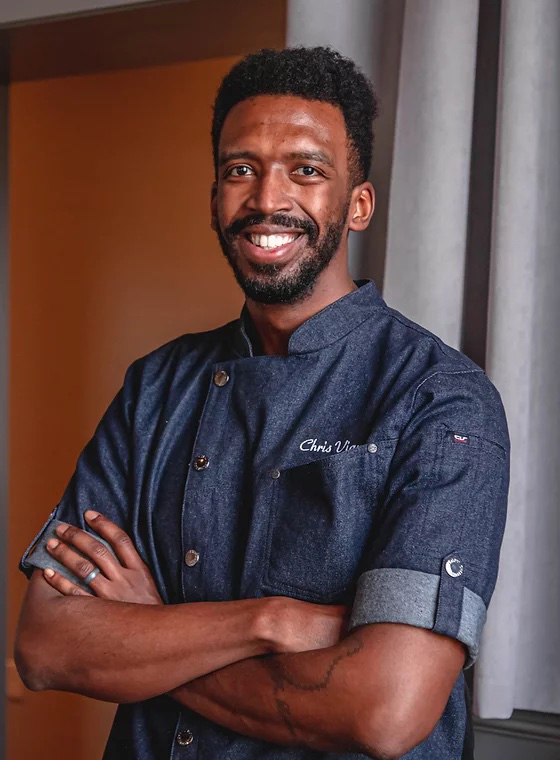Chef Chris Viaud

‘Everybody knows what it means to source locally,’ says Chef Chris Viaud, owner of Pavilion in Wolfeboro, ‘but not too many people know that there’s a revolution in terms of dining. And New Hampshire is part of that.’ Chef Viaud is a busy man, as the chef and owner of Greenleaf, a farm-to-table restaurant in Milford; Ansanm, authentic Haitian cuisine, also in Milford; and now Pavilion, a fine-dining establishment in Wolfeboro. From being a student at Johnson and Wales and working in a French fine-dining restaurant in Boston to being a contestant on Top Chef, Viaud has refined his culinary craft, focusing on locally grown produce that inspires his creative dishes.
Q. Why did you decide to focus on farm-to-table dining?
A. Farm to table was never really something that I was even focusing on in the beginning. When I was working in Boston, yes, we had access to some local produce, but it was always through distributors or purveyors. We never had the hands-on approach of going out to the farms.
And when I was opening my restaurant, I knew that my business partner was heavily involved in the farms. He had a farm-to-table catering, so I worked with him for a little while with that. And from there he led me in the direction of connecting with all these amazing farms.
The importance of the diverse dining scene that we’re starting to see now in New Hampshire is incredible. And the reason for Ansanm’s success is because of the customers who are willing to try something new. It’s incredible to see that people are willing to take risks by eating things that they’re so unfamiliar with.
Everybody knows what it means to source locally, but not too many people know that there’s a revolution in terms of dining. And New Hampshire is part of that, because we have Mexican chefs that are doing incredible things in the state. And to see that the community is willing to support all these diverse cuisines is awesome as well.
Q. Can you share more about your restaurants?
A. Green Leaf is an upscale casual comfort, farm-to-table dining, where we source a lot of our products from local farmers and we stick to planning our menus throughout the season.
Then, there’s Ansanm, which is a tribute to my Haitian heritage. Our family is heavily involved in that business, where my parents are at the forefront of all the food preparations and the menu. My sister is the director of operations of all three companies, so she’s heavily involved in everything. She helps keep me in line and stay on task.
Ansanm focuses on traditional Haitian food as well as a modern interpretation of Haitian flavors by incorporating dishes that are more familiar to American palates just by using Haitian ingredients and techniques.
And then we have Pavilion. It’s the same concept as Green Leaf where we stay true to sourcing from local farms and plan the menus around the seasons, but the atmosphere is a little more upscale than what Greenleaf is. It’s a beautiful contrast of being in all these different spaces and working with different individuals in each location. That helps to motivate me to keep doing what we’re doing.
Q. What advice would you give younger owners or chefs when they’re just starting out in their career?
A. Sounds cliche, but don’t be afraid to ask for help. There were definitely some points along the way where I wish I had more available resources to me. At the time when I was jumping in, it was like going in blind.
When we first started, we were in contact with the Small Business Association to help out with any available resources that might be available in the state. They guided us along the way throughout the course of the process, but a lot of it has just been figuring out as we go along.
Each business is so different that there’s no point-blank solution to what can be said about the steps that you need to take. But having somebody who’s willing to sit down with you and has gone through the motions of starting a business or multiple businesses can help ease the process, ease the burden.
I’m a huge advocate for supporting New Hampshire businesses and showing that especially in the restaurant community, there are a pocket of U.S. chefs that are doing incredible things.
There’s a few of us chefs that have been on Food Network and on Bravo highlighting the New Hampshire restaurant scene.
That’s what continues to motivate us and hopefully inspire and motivate the next generation that we can still do what we love to do while working in the Granite State.
To read more of this interview, visit nhbr.com.